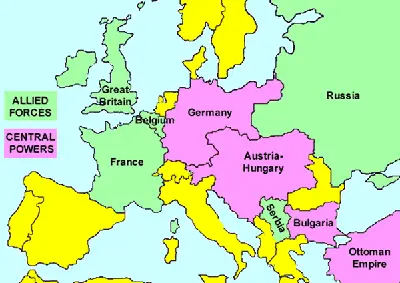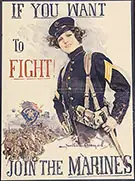Central Powers
The Central Powers were the Allies’ description of the wartime military alliance of Germany, Austria-Hungary, Bulgaria, and the Ottoman Empire.
The war was fought between two main groups of countries: the Allied Powers against the Central Powers.
The Central Powers were given this name because they were located in the center of the other great powers. They had the Russian Empire to the east, and France and the British Empire to the west.
At the start of the war, two countries formed the Central Powers:
- Austria-Hungary
- Germany
During the war, the Central Powers were joined by:
- Bulgaria
- Ottoman Empire


German Empire
Germany committed 11,000,000 troops to the war effort.
At the start of the war, the German Empire included:
- Alsace-Lorraine
- African colonies including:
- Cameroon
- German East Africa
- German Southwest Africa
- Togoland (a protectorate)
- German New Guinea (a protectorate)
- Kiautshou Bay concession
The Allied Powers invaded all of the German Empire’s colonies and dependencies during the war.

Austria-Hungary
Austria-Hungary sent 7,800,000 troops to war.
Austria and Hungary were individual countries with their own governments. However, they were ruled by one royal dynasty, called the House of Habsburg.
The Austrian Empire included:
- Kingdom of Bohemia (now known as the Czech Republic)
- Kingdom of Dalmatia (now part of Croatia)
- Kingdom of Galicia and Lodomeria (now divided between Poland and Ukraine)
The Hungarian Empire included:
- Kingdom of Croatia-Slavonia (now Yugoslavia)

Ottoman Empire
The Ottoman Empire committed 2,850,000 troops to the war effort.
Many territories of the Ottoman Empire did not exist as individual countries and their names were used to describe regions of land. It included the following nations:
- Turkey,
- Syria,
- Mesopotamia
- Palestine
- parts of the Arabian Peninsula
You might recognize their moderns names, including Lebanon, Israel, Saudi Arabia, Iraq, and other Gulf states.
The Ottoman Empire decided to remain neutral at the start of the war but joined the Central Powers in November 1914. This decision was based on its strong economic relationship with Germany.

Bulgaria
Bulgaria contributed 1,200,000 troops to the war.
Bulgaria had lost a battle with Serbia, Greece, and Romania in 1913, and remained hostile toward those countries. She had also signed a treaty with the Ottoman Empire in August 1914 to help defend the Empire if it were ever attacked. For both of those reasons, Bulgaria chose to enter the war in October 1915 by declaring war on her old enemy, Serbia.
In total, during the war, approximately:
- 3,386,000 Central Forces died
- 8,388,000 Central Forces were wounded
- 3,630,000 Central Forces were taken prisoner or missing

The Triple Alliance and Lost Allies
Three countries formed the Triple Alliance on 20 May 1881:
- Germany
- Austria-Hungary
- Italy
The Triple Alliance was an agreement to support each other if one of the countries was attacked by one of the other European great powers. Germany and Austria-Hungary were already allies, but Italy joined because of fears of an attack by France. Italy was also angry that France had been able to gain Tunisia as a colony, which Italy had hoped to gain as a colony itself.
The Triple Alliance was re-signed in 1902. But Italy also secretly signed a treaty with France. Italy promised to remain neutral if Germany or Austria-Hungary attacked France.
Italy saw the Triple Alliance as a defensive agreement. Since the war was not caused by an attack on Germany or Austria-Hungary, Italy did not join her alliance as a Central Power. Italy ended up joining the Allied Powers during the war.
Romania had secretly joined the Triple Alliance in 1883. Romania feared an attack by Russia, Serbia, or Bulgaria and wanted support from allies. But Romania did not join the Central Powers because Austria-Hungary had been the one to declare war. Romania eventually sided with the Allied Powers in 1916, after being promised Austro-Hungarian land if the Allied Powers won.
What did the Central Powers Want in WW1
Germany wanted to break up the French-Russian alliance and was ready to risk a major war in order to do so. An expansionist war of conquest was welcomed by some in the German elite. However, Russia, France, and Britain reacted defensively.



